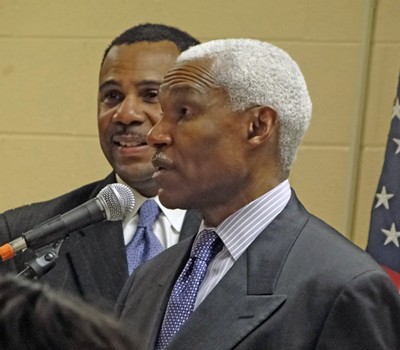 JB
JB
Wharton and Gilliom put their heads together.
Under the worst of circumstances, Mayor A C Wharton is preternaturally smooth and gets credit for trying. How else could he have won last year’s crowded special election with fully 60 percent of the vote?
On Tuesday night at Hickory Hill Community Center, Wharton displayed enough charm and sincerity — and, most importantly, know-how — to keep a packed house happy. And never mind that the questions he got at this, the mayor’s second “town hall” since taking office last October, showed that the attendees considered themselves to be in woeful circumstances indeed.
Back to that question of know-how: When Wharton held his first Town Hall at Breath of Life Christian Center in the Frayser-Raleigh area on the last day of November, he had armed himself with members of his administrative team — as he did again on the other side of town Tuesday night — and, not far removed from his former job as Shelby County mayor, more often than not deferred to them for answers.
On that first occasion, Wharton even allowed himself several “I-don’t-know’s.”
The ratio of deferrals to answers of his own had dropped considerably on Tuesday night, and it’s difficult to remember if there were any disavowals of knowledge on the mayor’s part at all.
Wharton clearly has learned the ropes of his new job, and, though he still let, say, Robert Lipscomb, the director of Housing and Community Development, answer in depth to the issue of when and whether Marina Cove, former site of the old Cablevision complex, might be rescued from its present state of dilapidation, the mayor himself spoke convincingly and at length of the need to revive Marina Cove along with Hickory Ridge Mall as the twin pillars of the area’s redevelopment.
Like the one about Marina Cove, a good many of the audience questions Tuesday night concerned various states of dishevelment or decay in the larger Hickory Hill community. Several of them concerned dumping of refuse in public areas.
Wharton established a bond with his audience when he acknowledged that dumping was a problem in his own neighborhood, too. Looking at the refuse near his home digs, he said, was instructive. “I can tell what people ate last night. I can tell what they drank.”
Then Public Works director Dwan Gilliom spoke up to promise authoritatively that a call to his office one day would result in the offending substance being picked up the next.
Hearkening back to a matter that had come up during the recent cold spell (and which had an unsettling resemblance to issues that had precipitated the fateful sanitation workers’ strike of 1968) — namely, the arbitrary decision by some sanitation work crews not to work in sub-freezing weather — Wharton promised, “I’m not going to put up with people deciding when they’re going to work.”
That remark, delivered in an unusually steely voice, generated a roomful of supportive applause.
Not every prospect discussed Tuesday night was so bleak. Lipscomb was so salvific as to pledge a “ten-year plan” to end homelessness in Memphis. A C himself talked about a massive Whitehaven redevelopment promised by the current managers of the Elvis Presley empire. And he worked in an optimistic plug for is current pro-consolidation initiative.
But, given the stated concerns of those present, there wasn’t that much to be uplifting about. The mayor was bluntly candid at one point when asked about the area’s — and the city’s — stray-dog problem. Some 70 percent of the strays were pit bulls, he told the audience, and with funds low and with dogs packed three to a kennel at the Animal Shelter, confessed, “It’s either that or we kill them….We don’t have the capacity to pick up strays.”
Issues related to garbage and sanitation kept resurfacing. One woman, a postal worker in uniform, expressed her irritation at finding empty garbage pails left in the streets by sanitation workers, blocking her access to postal boxes. “I love my customers. I don’t know about your people,” she said.
Close to the end of his remarks, Wharton gave her — and the rest of the Hickory Hill attendees — something of an answer to that. He was recasting the whole city work force, he said. It was being instilled in all city employees, in big jobs and small, to regard themselves as “customer servants.”
And though he didn’t designate himself specifically, his implication seemed clear enough: That included the mayor. And people in Hickory Hill and elsewhere will surely be looking to see how that works out.